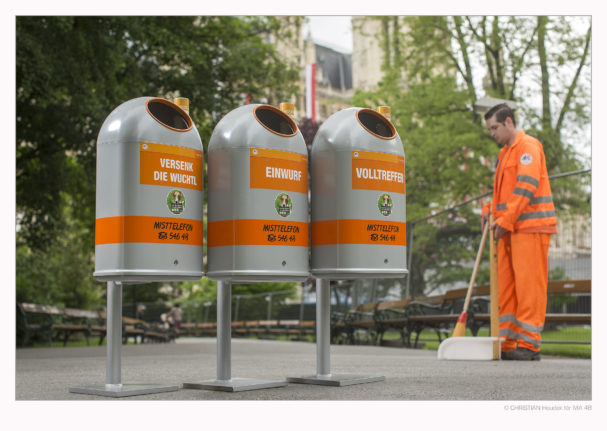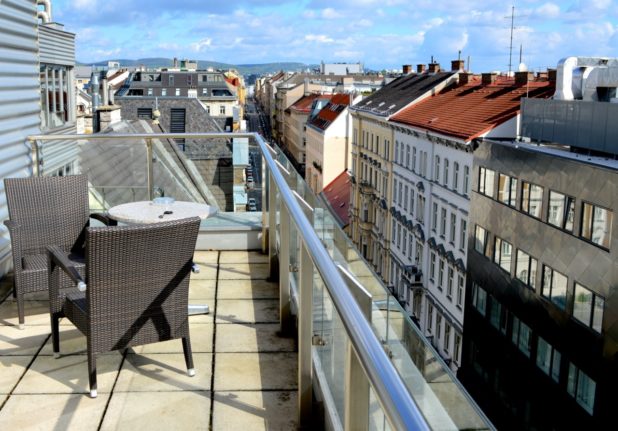Recycling is very much a part of Austrian culture. You will also find different bins for different waste items in almost every household in the country.
Every year, in Vienna alone, about 100,000 tons of recyclable organic material is collected in over 80,000 containers and processed into compost. This, in turn, can be collected by citizens in household quantities – so you can use your own trash to grow your plants.
Glass is also collected in separate containers, at over 2,500 public locations and at the dung places in the city. However, as they can be noisy, people should only dispose of glass waste between 6am and 10pm, according to the City of Vienna.
READ ALSO: How to dispose of unwanted furniture or whitegoods in Vienna legally
There are several containers throughout the cities where you can dispose of your waste. Still, it is crucial to do it right – and your neighbour will knock on your door if the things you are putting your paper together with your “common” trash.
Here are the main types of waste cans you will find in Austria – it is worth pointing out that these are based in the capital Vienna and might look a bit different depending on your region.
Waste paper
The Altpapier Karton, a red-coloured waste carton, is where you should dump your newspapers, magazines, catalogues, brochures, books, writing paper, letters, copybooks and telephone directories, as well as clean frozen food boxes, paper bags, and cardboard boxes (folded or filled with paper).
This is not a place to drop any composite materials, such as milk and beverage cartons, carbon paper, dirty papers, or receipts.
Organic waste
Also known as Biomüll, it usually has a brown colour. This is where you should throw away your lawn, tree and hedge cuttings. Weeds, shrubs, windfall, leaves, water plants, unseasoned and uncooked fruit and vegetable scraps, stale bread, coffee grounds, or tea leaves.
Organic waste disposal is no place for plastic, eco plastic bags, or eco plastic products. You should also not throw away meat, bones, food leftovers, large branches, eggs, dairy products, content from vacuum cleaner bags, cat litter, varnished or laminated wood, hazardous waste, composite materials such as nappies or milk cartons, or soil.
READ ALSO: Why does Vienna’s waste department have a helicopter and a military plane?
Clear glass
The clear glass (Weissglass) container, a grey one, will hold clear non-returnable glass bottles and pickle jars (they should be empty but not necessarily cleaned). You can also drop clear, condensed milk and soft drinks and any clear glass containers and transparent wine and liquor bottles.
Do not throw in any coloured glass, bottle caps, corks, lead seals (such as champagne bottles), screw tops, plastic bottles, mirrors, window glass, flat or wired glass, light bulbs, china, crystal glass or drinking glasses.
Coloured glass
The green container is reserved for Buntglass or coloured glass. This is where you should throw your coloured non-returnable glass bottles, such as slightly coloured glass, wine, soft drinks, and liquor bottles.
Brown and green glass can go in here together, along with other non-clear glasses.
READ ALSO: Austria to challenge EU nuclear green label in court
Just as with the clear glass, it is essential not to throw bottle caps, corks, lead seals (such as the ones from champagne bottles), screw tops, plastic bottles, mirrors, window glass, flat or wired glass, light bulbs, china, ceramics, crystal glass or drinking glasses.
Plastic bottles, drink cartons, cans
The yellow collection container will receive any plastic bottles, drink cartons and cans (Plastikflaschen, Getränkekartons, Dosen). This includes all plastic bottles for drinks (PET bottles), for supplies such as vinegar and dairy products, detergents and household cleaners, and plastic containers for cosmetics and toiletries.
READ ALSO: Hasta la mista, baby? How to vote for your favourite Vienna trash can joke
You may also add other plastic bottles, beverage cans, food cans, metal foil, metal tubes, metal tops of jars, and bottles.
Do not turn in any plastic objects (such as children’s toys), engine oil bottles, lubricant and adhesive bottles, plastic cups, plastic foil, plastic bags, meat trays, styrofoam, rubber foam, wood, textiles, canisters, buckets, cookware, tools, cables, wires, bathroom or kitchen taps, pipes, steel straps, paint, varnish, and spray cans, etc.
Other waste
The black box will receive all your other waste (Restmüll) and any other residual waste that shouldn’t be thrown in the recycle bins and is not hazardous or bulky.
Hazardous waste or bulky trash
It is illegal to dispose of hazardous or bulky waste in these containers. Instead, there are several collection points in Vienna and other cities where you can leave them. City services will also collect bulky waste for a small fee.
Do you have any more questions about recycling and waste separation in Austria? Get in touoch at [email protected] and we will find the answers for you.



 Please whitelist us to continue reading.
Please whitelist us to continue reading.
Member comments